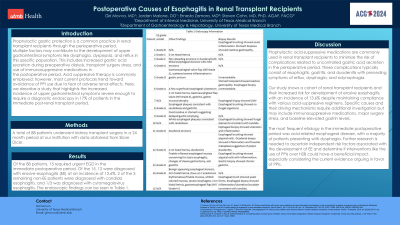Tuesday Poster Session
Category: Esophagus
P3945 - Postoperative Causes of Esophagitis in Renal Transplant Recipients
Tuesday, October 29, 2024
10:30 AM - 4:00 PM ET
Location: Exhibit Hall E

Has Audio
- GM
Giri Movva, MD
University of Texas Medical Branch
Galveston, TX
Presenting Author(s)
Giri Movva, MD, Jordan Malone, DO, Ernesto Zamora, MD, Steven Cohn, MD, PhD, FACG
University of Texas Medical Branch, Galveston, TX
Introduction: Prophylactic gastric protection is a common practice in renal transplant recipients through the perioperative period. Multiple factors may contribute to the development of upper gastrointestinal symptoms like dysphagia, dyspepsia, and reflux in this specific population. This includes increased gastric acid secretion during preoperative dialysis, transplant surgery stress, and use of immunosuppressive medications in the postoperative period. Acid suppressive therapy is commonly employed; however, most current protocols trend toward avoidance of PPI use due to fear of adverse renal effects. Here, we describe a study that highlights the increased incidence of upper gastrointestinal symptoms severe enough to require a diagnostic endoscopy in 17% of patients in the immediate post-renal transplant period.
Methods: A total of 88 patients underwent kidney transplant surgery at our institution over a 5-year period (2019-2023), with data obtained from Slicer Dicer, a query system.
Results: Of the 88 patients, 15 required urgent EGD in the immediate postoperative period. Of the 15, 12 were diagnosed with erosive esophagitis (EE) at an incidence of 13.6%. 2 of the 3 remaining non-EE patients were diagnosed with candida esophagitis, and 1/3 was diagnosed with cytomegalovirus esophagitis. The endoscopic findings can be seen in Table 1.
Discussion: Prophylactic acid-suppressive medications are commonly used in renal transplant recipients to minimize the risk of complications related to uncontrolled gastric acid secretion in the perioperative period. These complications typically consist of esophagitis, gastritis, and duodenitis with preceding symptoms of reflux, dysphagia, and odynophagia.
Our studyshows a cohort of renal transplant recipients and their increased risk for development of erosive esophagitis, with an incidence of 13.6% despite maintaining compliance with various acid-suppressive regimens. Specific causes and their driving mechanisms require additional investigation but may include immunosuppressive medications, major surgery stress, and baseline elevated gastrin levels.
The most frequent etiology in the immediate postoperative period was acid-related esophageal disease, with a majority of patients presenting with dysphagia. Further research is needed to ascertain independent risk factors associated with the development of EE and determine if interventions like the use of PPIs over H2B could have a beneficial impact, especially considering the current evidence arguing in favor of PPIs.
Note: The table for this abstract can be viewed in the ePoster Gallery section of the ACG 2024 ePoster Site or in The American Journal of Gastroenterology's abstract supplement issue, both of which will be available starting October 27, 2024.
Disclosures:
Giri Movva, MD, Jordan Malone, DO, Ernesto Zamora, MD, Steven Cohn, MD, PhD, FACG. P3945 - Postoperative Causes of Esophagitis in Renal Transplant Recipients, ACG 2024 Annual Scientific Meeting Abstracts. Philadelphia, PA: American College of Gastroenterology.
University of Texas Medical Branch, Galveston, TX
Introduction: Prophylactic gastric protection is a common practice in renal transplant recipients through the perioperative period. Multiple factors may contribute to the development of upper gastrointestinal symptoms like dysphagia, dyspepsia, and reflux in this specific population. This includes increased gastric acid secretion during preoperative dialysis, transplant surgery stress, and use of immunosuppressive medications in the postoperative period. Acid suppressive therapy is commonly employed; however, most current protocols trend toward avoidance of PPI use due to fear of adverse renal effects. Here, we describe a study that highlights the increased incidence of upper gastrointestinal symptoms severe enough to require a diagnostic endoscopy in 17% of patients in the immediate post-renal transplant period.
Methods: A total of 88 patients underwent kidney transplant surgery at our institution over a 5-year period (2019-2023), with data obtained from Slicer Dicer, a query system.
Results: Of the 88 patients, 15 required urgent EGD in the immediate postoperative period. Of the 15, 12 were diagnosed with erosive esophagitis (EE) at an incidence of 13.6%. 2 of the 3 remaining non-EE patients were diagnosed with candida esophagitis, and 1/3 was diagnosed with cytomegalovirus esophagitis. The endoscopic findings can be seen in Table 1.
Discussion: Prophylactic acid-suppressive medications are commonly used in renal transplant recipients to minimize the risk of complications related to uncontrolled gastric acid secretion in the perioperative period. These complications typically consist of esophagitis, gastritis, and duodenitis with preceding symptoms of reflux, dysphagia, and odynophagia.
Our studyshows a cohort of renal transplant recipients and their increased risk for development of erosive esophagitis, with an incidence of 13.6% despite maintaining compliance with various acid-suppressive regimens. Specific causes and their driving mechanisms require additional investigation but may include immunosuppressive medications, major surgery stress, and baseline elevated gastrin levels.
The most frequent etiology in the immediate postoperative period was acid-related esophageal disease, with a majority of patients presenting with dysphagia. Further research is needed to ascertain independent risk factors associated with the development of EE and determine if interventions like the use of PPIs over H2B could have a beneficial impact, especially considering the current evidence arguing in favor of PPIs.
Note: The table for this abstract can be viewed in the ePoster Gallery section of the ACG 2024 ePoster Site or in The American Journal of Gastroenterology's abstract supplement issue, both of which will be available starting October 27, 2024.
Disclosures:
Giri Movva indicated no relevant financial relationships.
Jordan Malone indicated no relevant financial relationships.
Ernesto Zamora indicated no relevant financial relationships.
Steven Cohn indicated no relevant financial relationships.
Giri Movva, MD, Jordan Malone, DO, Ernesto Zamora, MD, Steven Cohn, MD, PhD, FACG. P3945 - Postoperative Causes of Esophagitis in Renal Transplant Recipients, ACG 2024 Annual Scientific Meeting Abstracts. Philadelphia, PA: American College of Gastroenterology.
